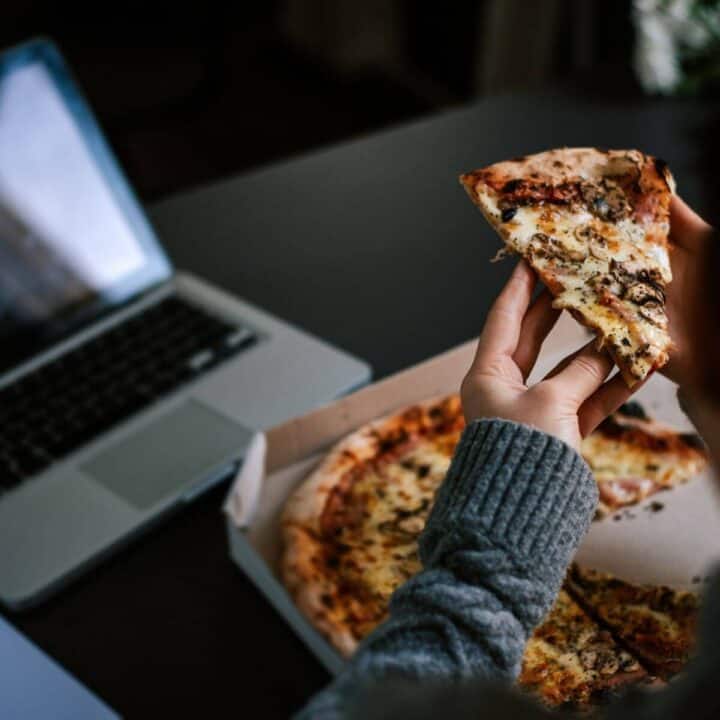As a nutritionist, I've worked with many clients who struggle with late night snacking for weight loss. Whether due to boredom, stress, or habit, mindless snacking in the evening can quickly derail your weight loss efforts and leave you feeling guilty and frustrated. However, with a few simple how-to strategies, you can overcome the urge to snack at night and stay on track with your healthy eating goals. In this article, I'll share tips to help you avoid and break the cycle of late-night snacking to take control of your eating habits. Learn how to stop late night snacking.

Table of Contents
To stop late night snacking, consider these easy tips. Implementing these strategies may help reduce or eliminate late night snacking habits. Ready to learn how to avoid late night snacking?
✅ Simple Tips to End Late Night Snacking Habits
Here are a few easy ways to finally understand and learn how to avoid that late night snacking habit and achieve your healthy weight loss goals.
Identify Your Triggers
The first step in overcoming late-night snacking is to identify your triggers. What emotions, situations, or habits lead you to reach for food in the evening? Do you snack out of boredom, stress, or as a way to unwind after a long day?
Once you've identified your triggers, you can start to develop alternative coping strategies that don't involve food. For example, if you snack out of boredom, try finding a new hobby or activity to keep your hands and mind busy in the evenings.
Establish a Routine
Stick to a regular meal schedule to prevent hunger later in the night. Mindful eating practices are important. Be aware of what and when you eat throughout the day. Eating regular, balanced meals can keep your hunger levels stable and prevent late-night cravings.
Also, being mindful about your eating during the day-paying attention to the taste, texture, and satisfaction of your food-can help you gain control over your eating habits.
Healthy Alternatives
Keep nutritious snacks like fruits and vegetables on hand if you must snack. Choosing healthy late-night snacks can help maintain your health and manage hunger effectively.
Opting for nutritious alternatives over high-calorie or sugary snacks can have numerous benefits for your overall well-being. Here are some balanced choices that not only satisfy late-night cravings, but also contribute to a healthier lifestyle.
- Greek Yogurt and Berries: A mix of Greek yogurt with blueberries or strawberries offers protein and antioxidants, aiding in muscle repair and providing a sweet taste without excess sugar.
- Sliced Apple with Peanut Butter: The combination of creamy peanut butter and crisp apple is satisfying, but also packs a mix of fiber and protein, promoting satiety and aiding digestive health.
- Whole Grain Gluten-Free Toast with Avocado: Avocados are a great source of mono-unsaturated fats (the good fats) and fiber. When paired with whole grain gluten-free bread, this snack provides a balanced amount of complex carbs and fats that can help you feel full and satisfied.
- Almonds or Walnuts: Nuts are an excellent source of healthy fats, protein, and fiber. A small handful of almonds or walnuts can help stave off hunger without spiking your blood sugar.
- Cottage Cheese with Pineapple: Cottage cheese is high in protein, which can be beneficial for muscle repair overnight. The addition of pineapple provides a fresh and natural sweetness to satisfy any late-night sugar cravings.
- Air-popped Popcorn: A light and low-calorie option, popcorn provides a fulfilling and fiber-rich choice for those needing to snack on something during late-night hours. Just avoid excessive salt or butter.
Incorporating these snacks into your late-night routine can help keep you not only full, but also nourished. Picking the right snacks can have a positive impact on your sleep quality and help control those pesky late-night urges effectively.
Stay Hydrated
Sometimes thirst is mistaken for hunger. Drinking water can curb the urge to snack. Staying hydrated is key to preventing late-night snacking. Drinking enough water can help control your appetite and curb cravings that often lead to unnecessary snacking.
Manage Stress
Stress can lead to snacking. Try relaxation techniques like meditation or reading. To effectively manage stress and thus reduce the tendency for late night snacking, consider implementing multiple strategies to ensure a holistic approach.
Regular physical activity can greatly aid in stress reduction and overall health. Even a short walk in the evening can help clear your mind and reduce the impulse to snack.
Develop stress management techniques, such as meditation, deep breathing exercises, or journaling. Managing stress in healthy ways helps prevent stress-eating triggers.
Create a Supportive Environment
Make it a habit to keep healthier snack options within reach, and limit the availability of highly palatable, less nutritious snacks. This doesn't mean you can never have these treats, but if they are less accessible, you're less likely to eat them absentmindedly.
Implementing these methods collectively should help manage stress more effectively and decrease the likelihood of late-night snacking.
📥 GET THIS RECIPE IN YOUR INBOX 📥
Avoid Buying Snacks
Simply not having unhealthy snacks in the house can eliminate the temptation. To curb late-night snacking, it's advisable to refrain from purchasing snacks that don't fit into your healthy lifestyle.
Plan Ahead
Another key to stopping and avoiding late-night snacking is to plan ahead. Make sure you're eating balanced, satisfying meals throughout the day, including a protein-rich breakfast and lunch and a filling dinner.
If you know you tend to get hungry in the evenings, plan a healthy snack that fits into your daily calorie and nutrient goals, like a piece of fruit with nut butter or a small handful of nuts. By having a plan in place, you'll be less likely to mindlessly reach for junk food when hunger strikes.
Create a Relaxing Bedtime Routine
Finally, creating a relaxing bedtime routine can help you wind down in the evenings without turning to food. Instead of snacking in front of the TV or scrolling through social media, try taking a warm bath, reading a book, listening to soothing music, or practicing some gentle stretches or yoga. This can help signal your body that it's time to wind down and go to sleep, rather than reach for snacks.
These activities can help you relax and prepare for a good night's sleep, without the need for late-night snacks. Aim to stop eating at least two hours before bedtime to give your body time to digest and avoid disrupting your sleep.
Adequate sleep is crucial for sustainable weight loss. Ensuring you get enough sleep each night, as sleep deprivation can lead to increased hunger and appetite.

🧡 Signs Your Mindless Late Night Snacking Habit Is Hurting Your Weight Loss Goals
Mindless snacking at night can be a common habit that sabotages your health and weight management goals. Here are some detailed signs that you might be engaging in this behavior.
- Consistent Late-Night Kitchen Trips - If you repeatedly head to the kitchen to grab a snack, especially right after dinner or late at night, it might be a sign of mindless snacking.
- Eating Without Hunger - Snacking when you're not actually hungry, but perhaps bored, stressed, or tired, is a classic sign of mindless eating.
- Choosing Unhealthy Snacks - Often, mindless snacking involves reaching for junk food like chips, cookies, or candy rather than healthier options.
- Not Paying Attention to Portions - Consuming large amounts of snacks without realizing it can be due to not paying attention to how much you're eating.
- Eating While Distracted - If you tend to eat while watching TV, working at your computer, or scrolling through your phone, you might be more likely to overeat or snack mindlessly.
- Feeling Guilty or Regretful After Snacking - Emotional responses like guilt or regret following snacking can indicate that it was unnecessary and not driven by hunger.
- Disrupted Sleep Patterns - Late-night snacking, especially on foods high in sugar or caffeine, can disrupt your sleep, contributing to a vicious cycle of fatigue and more snacking.
Recognizing these signs can help curb this habit, such as stricter eating schedules, healthier snack options, and alternative ways to address boredom or stress.

🗣️ Let's Discuss Late Night Snacking And Your Weight Loss Goals
So, have you been surprised that all that late night snacking affects your weight loss goals? Did you like the practical tips to help you avoid those late night trips of snacking mindlessly? Let me know your personal experience below?
You can also connect with me @EatYourNutrition on Instagram. I love seeing your photos. #EatYourNutrition #LauraVillanueva
👉 ADDITIONAL RESOURCES
Also, for further reading and guidance on how to go safely and effectively lose weight, consider exploring the following resources.
Prep for the ultimate total body reset to nurture and love the body you're in. Eat foods designed to help you feel refreshed. Download my free guide, Total Body Reset Guide.
👉 Seeking Sustainable Weight Loss Help?
If you're looking for more guidance and support in overcoming and stopping late-night snacking that also hinder your weight loss efforts, I invite you to join my sustainable weight loss program, A Fresh Start, Healthy Weight Loss program. As a nutritionist, I'm here to help you stay on track with your health goals with an easy to follow program that achieves results. Take the first step towards a healthier, happier you today!

- Support - Join A Fresh Start Healthy Weight Loss Program. Begin your journey today.
- Want a simple healthy eating guide with tools to become a healthier, happier, you? Try the healthy eating tips and recipes inside the Radiant Healthy Eating Guide.


















Comments
No Comments